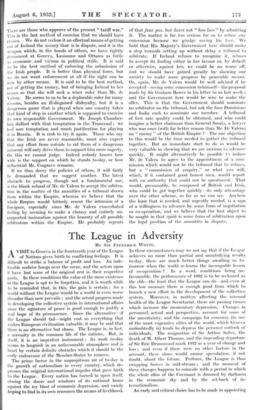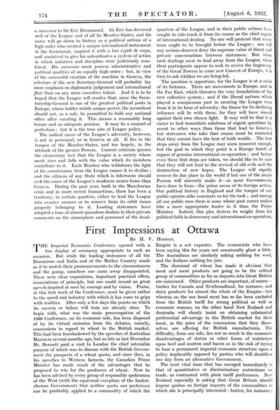The League in Adversity By SIR FREDERICK WHYTE.
AVISIT to Geneva in the fourteenth year of the League of Nations gives birth to conflicting feelings. It is difficult to strike a balance of profit and loss. An inde- finable malaise hangs over the scene, and the actors upon it have lost some of the original zest in their respective parts. In these conditions the value of the mere existence of the League is apt to be forgotten, and it is worth while to be reminded that, in this, the gain is certain ; for a world without the League would be a world in even worse disorder than now prevails ; and the actual progress made in developing the collective system in international affairs since the signature of peace is good enough to justify a real hope of its permanence. Since the alternative—if the League should fail—might cost us everything that makes European civilization valuable, it may be said that there is no alternative but chaos. The League is, in fact, a necessity in the common life of the nations. But, in itself, it is an imperfect instrument ; its work to-day seems to languish in an unfavourable atmosphere and is beset by certain definite obstacles which it should be the early endeavour of the Member-States to remove.
The prime factor in the unpropitious air of to-day is the growth of nationalism in every country, which de- presses the original international impulse that gave birth to the League. Every nation has turned in upon itself; closing the doors and windows of its national home against the icy blast of economic depression, and vainly hoping to find in its own resources the means of livelihood. In these circumstances may we not say that if the League achieves no more than partial and unsatisfying results to-day, there are much better things awaiting us to- morrow when the world re-learns the inescapable lesson of co-operation ? In a word, conditions being un- favourable, the performance of 1982 is to be reckoned as the ebb—the least that the League can do—and even at this low measure there is enough good from which to launch a new effort in the development of the collective system. Moreover, in matters affecting the internal health of the League Secretariat, there arc passing causes which increase the momentary depression. Changes in personnel, actual and perspective, account for some of the uncertainty, and the campaign for economy (in one of the most expensive cities of the world, which Geneva undoubtedly is) tends to depress the personal outlook of individuals. The resignation of Sir Arthur Salter, the death of M. Albert Thomas, and the impending departure of Sir Eric Drummond mark 1982 as a year of change and loss ; and even if there were no other factors in the account, these alone would arouse speculation, if not doubt, about the future. Perforce, the League is thus swapping horses in mid-stream ; and the moment of these changes happens to coincide with a period in which the whole ethos of the Covenant is dimmed by darkness in the economic sky and by the set-back of in- ternationalism.
An early and critical choice has to be made in appointing • a successor to Sir Eric Drummond. Sir Eric has deserved well of the League and of all its Member-States, and his name will go down to history as a political artisan of a high order who created a unique international instrument in the Secretariat, inspired it with a fine esprit de corps, and contrived to give his subordinates a system of action in which initiative and discipline were judiciously com- bined. His successor must possess administrative and political qualities of an equally high order : but, in view of the successful creation of the machine in Geneva, the selectors of the new Secretary-General will probably lay more emphasis on diplomatic judgement and international flair than on any mere executive talent. And it is to be hoped that the League will resolve that, since the Secre- taryship-General is one of the greatest political posts in Europe, whose holder wields unique power, the incumbent should not, as a rule, be permitted to hold any national office after vacating it. This means a reasonably long tenure and an adequate pension. It may be a counsel of perfection : but it is the true aim of League policy.
The radical cause of the League's adversity, however, is not in personnel, or in Geneva at all. It lies in the temper of the Member-States, and too largely, in the attitude of the greater Powers. Current criticism ignores the elementary fact that the League is a society whose merit rises and falls with the value which its members contribute to it. Each Member who withdraws the light of his countenance from the League causes it to decline ; and the citizens of any State which is lukewarm should seek the cause of the League's weakness nearer home than Geneva. During the past year, both in the Manchurian crisis and in more recent transactions, there has been a tendency, in certain quarters, either to lead the League into evasive courses or to remove from its orbit issues properly belonging to it. Leading statesmen have adopted a tone of almost querulous disdain in their private comments on the atmosphere and personnel of the head- quarters of the League, and in their public actions have sought to side-track it from its course as the chief engine • of international dealing. No one will pretend that every issue ought to be brought before the League ; nor will any serious observer deny the supreme value of direct and private conversations between statesmen. But when such dealings seem to lead away from the League, when their participants appear to seek to revive the hegemony of the Great Powers in some new Concert of Europe, it is • time to ask whither we are being led.
The question is opportune, for the League is at a crisis of its fortunes. There are movements in Europe, and in the Far East, which threaten the very foundations of the new collective system ; and if the liberal nations which played a conspicuous part in creating the League turn from it in its hour of adversity, the blame for its declining influence will lie with them, for they will have sinned against their own chosen light. It may well be that it is easier to find immediate solutions of urgent questions by resort to other ways than those that lead to Geneva ; but statesmen who take that course must be reminded that they cannot have the best of both worlds. The first steps away from the League may seem innocent enough, but the goal to which they point is a Europe bereft of organs of genuine international co-operation ; and before even these first steps are taken, we should like to be sure that they will not lead to the revival of old evils and the destruction of new hopes. The League will rapidly recover its due place in the world if but one of the major Powers will sincerely make it—as most Governments have done in form—the prime arena of its foreign action. Our political history in England and the temper of our public opinion alike nominate us for the task ; and among all our public men there is none whose past career makes him a more appropriate leader in it than the Prime Minister. Indeed, this plea derives its weight from his political faith in democracy and international co-operation.



























 Previous page
Previous page